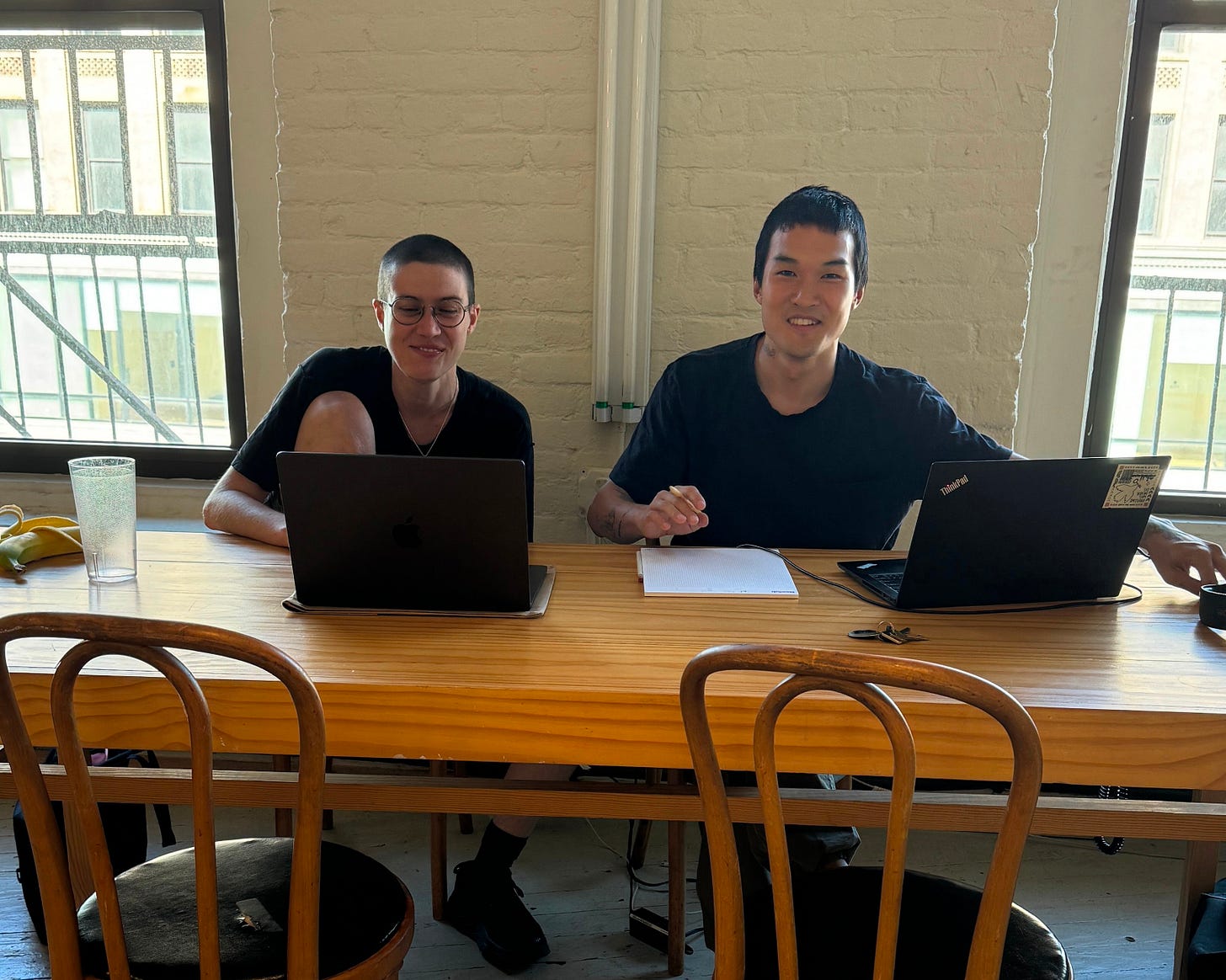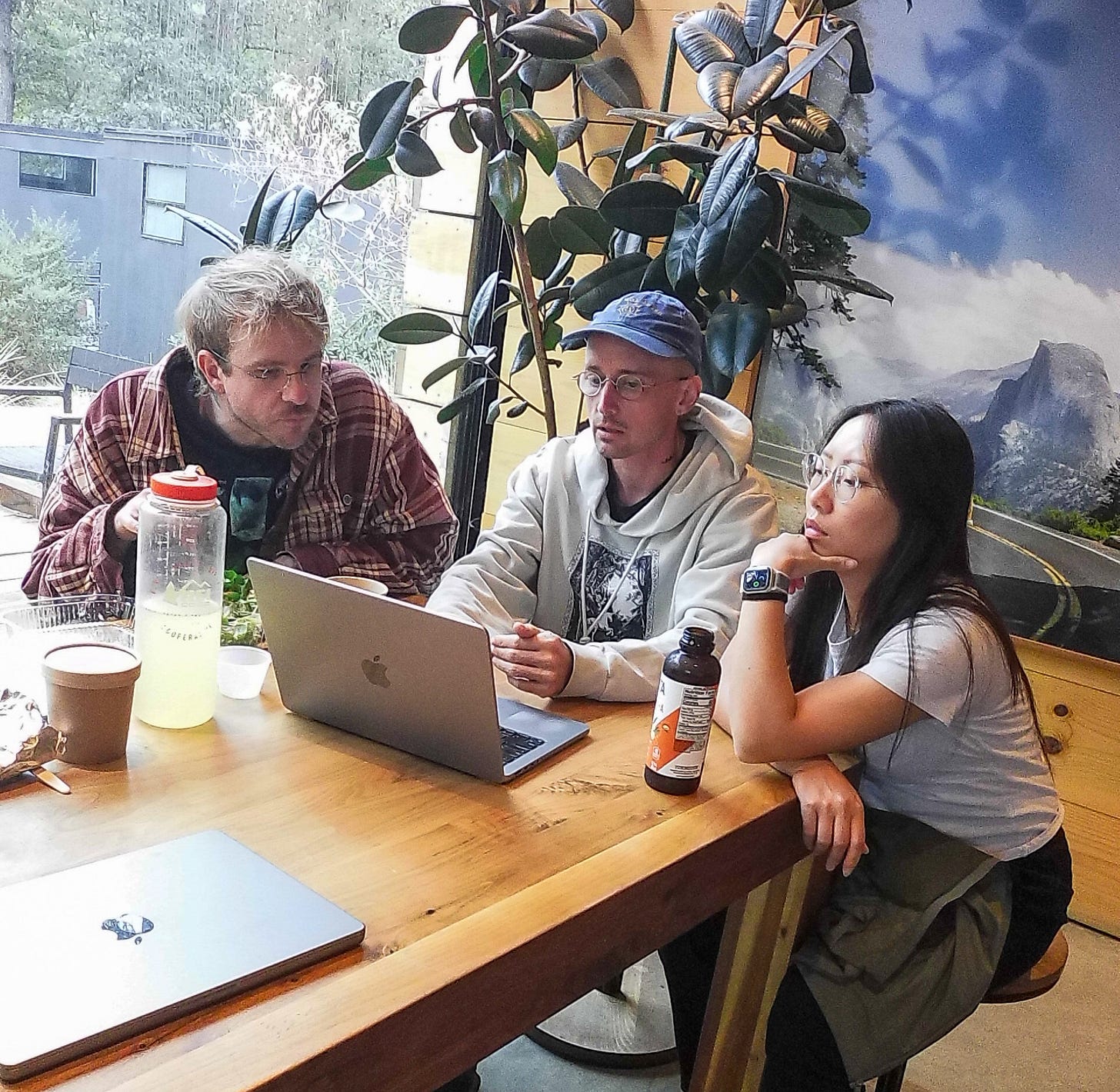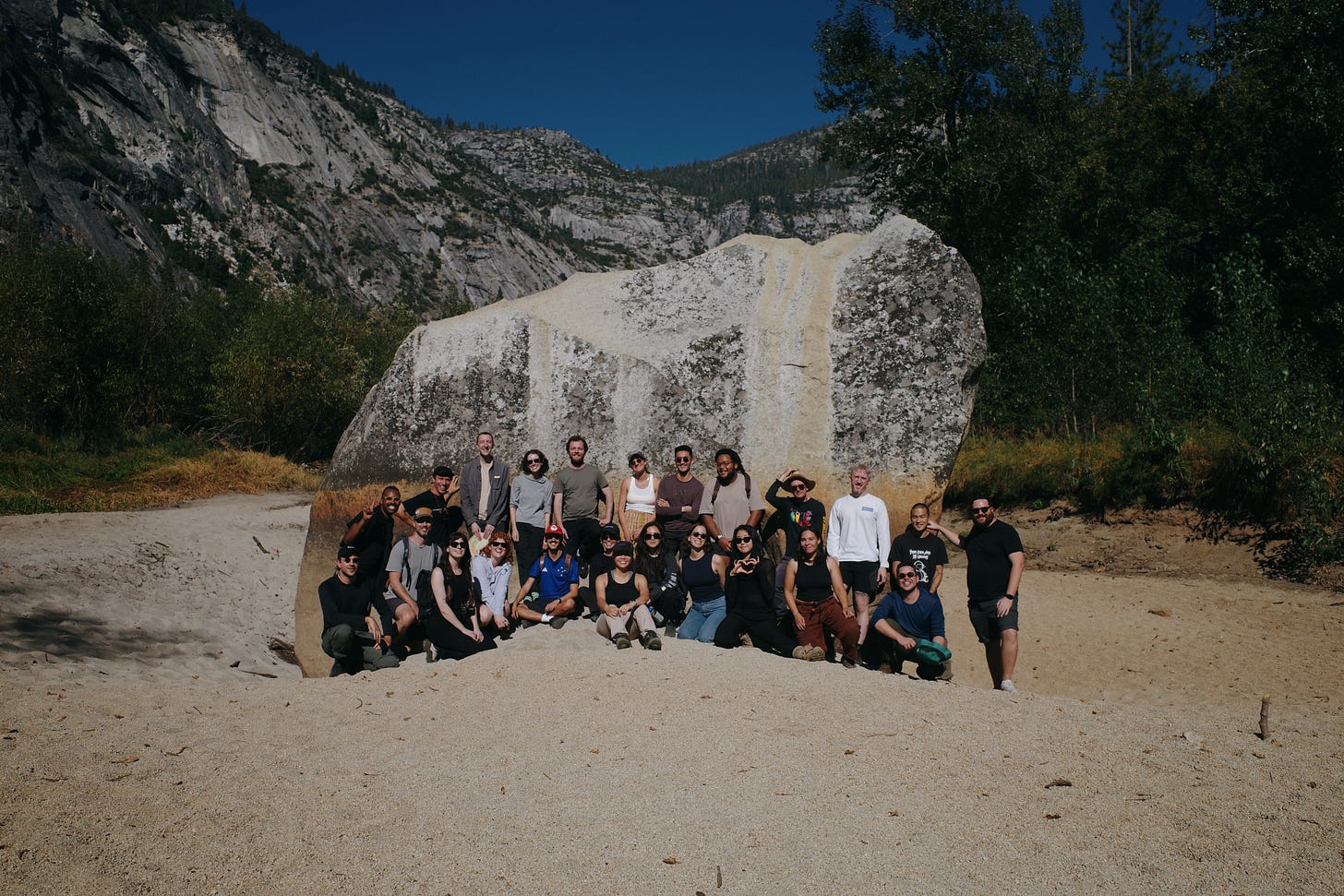garden3d DEI Report 2024
Our annual report on building a more inclusive workplace, year by year.
What is garden3d?
garden3d is a collective of creative businesses, currently consisting of:
XXIX, our design studio
Sanctuary Computer, our development studio
Index, our community center
Seaborne, our sustainability consultancy
Why are we doing this?
Since 2022, garden3d has committed to releasing a Diversity, Equity, and Inclusion (DEI) report each year. By releasing this data, we can increase visibility across the studio, and actively make progress and meaningful change toward a more inclusive workplace based on actual data.
Over the last year, DEI efforts have been drastically de-prioritized in the tech sphere. Many major companies cut DEI programs created to support underrepresented groups as a result of tightened budgets. Reports continue to be published while the actual efforts are unclear, and the data collected still limits representation. For example, only one out of the ten biggest tech companies mentioned including any gender nonbinary statistics.
At garden3d however, we feel this work is as urgent as ever. Our three years of focused efforts shaping conditions for all people at our company to thrive has taken root, and we’re now seeing the fruits of this labor. This year, we built individualized growth frameworks, developed data-driven and holistic feedback mechanisms, and interwove team support structures to continue adapting the needs of our team to build a stronger, safer, and more inclusive organization.
Read last year’s report here and 2022 here →
How we define DEI at garden3d:
In general, Diversity, Equity, and Inclusion is defined as:
Diversity: the presence of differences within a given setting.
Equity: the practice of ensuring that processes and programs are impartial, fair, and provide equal possible outcomes for every individual.
Inclusion: the practice of ensuring that people feel a sense of belonging in the workplace.
(source: BuiltIn)
Our DEI work at garden3d is centered on creating a safe and equitable space that is inclusive and encourages all people to be their true selves. We’ve chosen the BICEPS framework as the guiding philosophy behind our DEI work. BICEPS focuses on addressing our core needs as humans: Belonging, Improvement, Choice, Equality/Fairness, Predictability, and Significance. By understanding each individual’s personal hierarchy of these needs and working to meet them accordingly, we create a more inclusive atmosphere for everyone.
The power of this framework is that it suggests an individualized approach rather than a standard one, allowing us to meaningfully address the reality that we don’t all start from the same place. Through this work, we aim to enable everyone who works here to have the same access to opportunities and success.
Since our needs as people are not static, our DEI work cannot be either. It’s about continually shaping a fertile ground for diversity to flourish. This is why our DEI working group meets each month to dedicate time and space to our internal goals, and why we decided to release a yearly report.
The Datazone
Disclaimer! In this section, we will be presenting data on the identities and backgrounds of the people in the studio, and visualizing the data in graphs. At garden3d, we have a strong philosophy in avoiding tokenizing or reactionary behavior. We collect and observe this data as one of many inputs, to pick up on patterns over time that may tell a story, and ultimately help us understand our organization better. For instance, if we find a pattern in that specific gender identities or skill levels are leaving the company, we’re able to more easily identify the challenge, and put a concentrated effort towards a solution.
In last year’s report, we focused on the skill level breakdowns across everyone who works at garden3d and how these intersect with their racial background, gender identity, and community. Below you’ll find an overview of garden3d’s demographics for the year, and how this data compares to current industry averages according to the US Equal Employment Opportunity Commission’s report, High Tech, Low Inclusion.
Industry average data is largely limited to racial identities, not reflecting the regional and cultural nuance that exists within these broad categories. This applies to the data collected on gender identity in the workplace as well, which is limited to “male” and “female.”
Racial Backgrounds at garden3d



Gender Identities at garden3d


Communities at garden3d

Please see our 2023 DEI Report or 2022 DEI Report to compare previous year’s data.
What We’ve Accomplished in 2024:
At garden3d, DEI work is organized and executed by the DEI Working Group, consisting of team members who have opted in to action our current initiatives.
This year, we set a goal to hone in on one initiative per quarter, some of which were named in our 2023 report, including working on allocation for our Project Leads and testing a new rotation process for stewarding the DEI Working Group. Overall, our work for 2024 continued to champion employee wellbeing, safety, and inclusion. We created new tools and restructured some existing ones to achieve the following goals.
Making a Speciality Role More Transparent

The Project Lead (PL) role indicates a person who’s responsible for organizing day-to-day work and communications between individual contributors and clients. Early on, we made an intentional choice not to have (traditional) project managers—something you can read more about in Managing is a Maker’s Skill. TLDR; we choose to skip the extra bureaucracy and let creative people self-organize to produce their work.
Even so, we recognize the need for structure—the Project Lead is responsible for the holistic success of a project, and this role can take anywhere from 10-50% of an individual’s time, per project. It’s typically taken on by more senior craftspeople when they’re ready to grow in their career, but we noticed that longer-term projects also required longer-term PLs, which could affect time dedicated to craft work, and create conflicting priorities between the Project Lead work and growing craft leadership skills. We still stand by managing being a maker’s skill, but determined that an individualized approach was needed to best match PLs with the needs of a specific project (and vice versa).
This year, we wanted to make sure that the Project Lead role is well-incentivized and more equitably distributed across our organization. This role requires a specific skill set, and we also wanted to create more transparency on how to improve in this realm. While these efforts are still in progress, we were able to take some important steps:
Tying Project Leadership to Career Growth
At garden3d, we grow in our roles through the Skill Tree, a deterministic rubric specifying the skills required of each role at our company (learn more about Skill Trees in How We Set Salaries). This year, we added language specific to Project Leadership to each category, providing a more concrete path for upskilling. This rubric allows us to provide a more holistic approach to feedback and increases transparency for Project Lead skill levels across our company.
Resourcing and Incentivizing PLs
This year we developed a new framework for resourcing PLs, to assign the role equitably and find opportunities for upskilling. The role was also added as its own category to profit share distribution; PLs are given additional profit share units to incentivize folks to grow into this role, and to compensate for the extra responsibility that comes with it.
Revamping Internal Surveys for Employee Satisfaction
In 2024, we created a new Workplace Satisfaction survey of “Happiness Questions” to collect feedback from our team about their wellbeing. The survey is made up of ratings-based questions similar to previous internal surveys we have circulated, with the questions themselves drawing from the BICEPS framework mentioned above. This time we added open-ended questions in the interest of capturing higher quality responses. Each survey was collected anonymously, to create a sense of safety around freely sharing experiences.
We found that adding open-ended questions allowed survey-takers to spend more time with the questions and insert their voice into the response. Short answers gave us more to work with, collecting more specifics than numbers-based ratings alone. With more information, we’re able to more thoroughly determine what actions can come from these responses.
On the flip side, short-answer questions require more of everyone’s time—both the survey takers and those who are synthesizing the results. It’s important to us to address everyone’s specific feedback so that they feel acknowledged and considered in changes moving forward. We’re continuing to fine tune this new approach to internal surveys to make for the most actionable data, and will be using this year’s process to identify what we can do to improve.
Maturing with our Values
Last year’s Workplace Satisfaction surveys revealed a need for more mentorship, strategic growth opportunities for our team, and recognition for those bearing the brunt of added responsibility.
As a response to this need, we broke from our title-free past to create a Director-level role tier at garden3d, including a Technical Director, Creative Director, Director of Business Development, and Director of Project Delivery.
Through much consideration and open discussion among the team, we debated the tension between dueling needs for autonomy (one of the key reasons why people come to work at a company like ours) and structure (a core human need). We knew more structure was needed, but how to grow it in a way that’s egalitarian, complementary, and true to our values? This will be an ongoing exploration as we integrate these roles into the design of our organization.
One of the ways we’ll ensure the Director-level position is serving the rest of our company — and not the other way around — is by using the Workplace Satisfaction survey. The quantitative results provided by the garden3d team affect whether Directors at our company receive additional profit share units.
Merging Working Groups with Complimentary Missions
garden3d operations consist of a network of Working Groups, which all serve unique communities and initiatives within our team. Gardenxrs, for example, is for employees who are part of non-dominant gender groups—those that are largely underrepresented in tech. The data and content for this report was provided by the DEI Working Group, which is dedicated to discussing, facilitating, and implementing organizational changes related to garden3d’s DEI goals.
Other garden3d Working Groups include the Maker Synergy Working Group, a monthly meeting to discuss collaboration between designers and developers, the Charitable Giving Working Group, which allocates an annual budget to charities and non-profits, and the Retreat Planning Committee, which organizes our annual company retreat.
In lieu of HR or operations teams, Working Groups are an important infrastructure for self-management at garden3d, ensuring that the work that supports the work happens in organized, distributed ways. We have found that empowering people to join and contribute to Working Groups gives them greater stake in the happiness of our team, and the success of our business.
Herb Garden x DEI Working Group
The Herb Garden, another garden3d Working Group, was founded in 2020 when our company went remote. We realized that the kind of support and community that naturally came from sharing a physical space was harder won in a remote setting. To combat this we formed the Herb Garden, a group for anyone interested in providing counsel, support, and an open ear to other team members. Participants in the group, known as Herbalists, were given guidance on nonviolent communication and basic methods for fostering psychological safety, and then assigned several Seedlings, or team members with whom they would meet regularly and confidentially to discuss any needs related to their life at garden3d.
This work soon became tied to all qualitative experiences at garden3d, ballooning into survey creation and synthesis, and general employee safety. This year we decided that combining the Herb Garden and DEI Working Groups would actually strengthen their efforts, as so many of them already overlapped. We set a new mission for the two groups in 2024 to merge under the DEI Working Group, enabling the Herb Garden to streamline its focus on providing confidential, 1-on-1 peer support sessions with everyone at garden3d.
Moving Forward
With an emphasis on improving structural changes to the design of our organization, next year the DEI Working Group will continue to refine the mechanics of project leadership and our feedback culture.
As the team develops an updated Skill Tree 3.0, we will work to ensure the Project Lead skill level system is integrated holistically, supporting team members’ upskilling in this role. Working closely with our new Head of Project Delivery, we’ll develop standards of support, wellbeing and equity that help our team thrive in this capacity.
As with this year, we’ll continue to use the DEI Working Group as a platform to respond to team Workplace Satisfaction surveys and shape updates to our organization accordingly.
Conclusion
Over the past three years, we’ve worked hard to till the land into a fertile crescent of equity and inclusion at garden3d. We were able to slow down this year and focus on longer-term initiatives, which is how we want to continue operating—not putting out fires and preparing for floods, but nourishing our soil, sowing our seeds, tending our crops, and reaping our harvests together.








